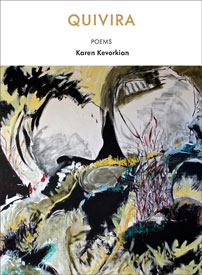Our Authors

Karen Kevorkian
In Karen Kevorkian’s third poetry book, Quivira, the title is a metaphor for a place of unimaginable riches, never to be found, which lured early explorers across the arid Southwest. The intensity of such longing is not unknown by those making contemporary quests. The force of such feeling, in sharp contrast to the spare, particular beauties of the High Desert, speaks not only of desire but also to the rough accommodations made for desire unsatisfied. Kevorkian’s book is personal, but the personal is never detached from events of culture and history.
Quivira, Karen Kevorkian’s dazzling new collection of poems, explores the ways in which time can be measured in movement–in her case through the vast, riveting, and often bewildering spaces of the American West. Voices, familiar and otherwise, inhabit these poems, which ceaselessly interrogate the land and its varieties of human and nonhuman experience: “what an idea trying to outrun/ the fire,” she writes, “in a moment/ on you.” No one escapes the fire in these poems, which will burn for a very long time to come.
—Christopher Merrill, Self-Portrait with Dogwood
In Quivira, Karen Kevorkian reconfigures a pastoral topography populated by memory and disrupted by a history of unacknowledged violence. The body’s memory and the recovery of its elisions are localized in the landscapes of New Mexico, the Southwest, and Los Angeles. “Where men strap on leaf blowers” “in fantasies of Spanish stucco”, Kevorkian evokes the longing for a present embodied by the truths of genocide and the acknowledgement of common loss. Among the mudbricked churches, “the little mustached saints’ bedroomy eyes,” the tin wings of angelitos, the Catholic hand-carved icons scrubbed clean of conquest and colonization, Kevorkian recovers the scars, the beauty, and the sensuality of living among the ghosts of History and memory.
—Ramón García, The Chronicles
Who is speaking throughout these poems? The delight is in the blur; first-person becomes every-person, every-person a layered construct of past-and-present persons, and over all of this breathes the vast American West, which is itself a simultaneity—of time frames, landscapes, and cross-hatched journeys. Kevorkian’s third poetry collection is redolent with history, especially the history of cultures’ shifting claims over a region that remains resolutely itself—volcanic, untamable, partially-mapped. Its laminate past is evoked through specific detail and moments of electrifying phrasing which nevertheless leave space for the reader to grasp not just a panorama of fleeting observations, but a tremendous intelligence at work.
—Leslie Ullman, Library of Small Happiness
Karen Kevorkian is the author of two poetry collections, White Stucco Black Wing (Red Hen Press, 2004) and Lizard Dream (What Books Press, 2009). Her work appears in The Antioch Review, Michigan Quarterly Review, Denver Quarterly, Colorado Review, Los Angeles Review of Books, Virginia Quarterly Review, Massachusetts Review, and elsewhere. She received fellowships from the Helene Wurlitzer Foundation, the MacDowell Colony, the Millay Colony, the Ucross Foundation, and the Djerassi Foundation. Kevorkian was born in San Antonio, Texas, and received a BA from the University of Texas, Austin, and an MFA from the University of Virginia. She is a lecturer at the University of California, Los Angeles.

